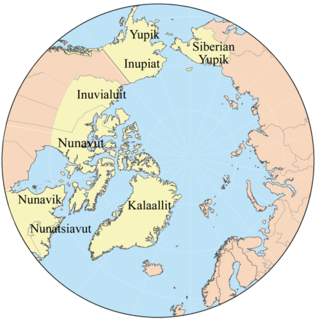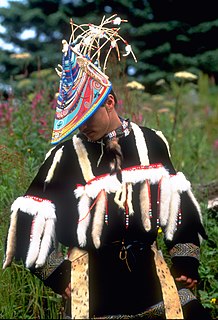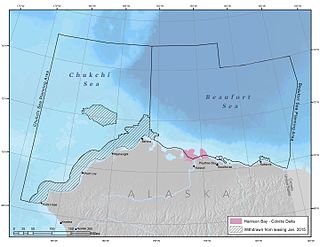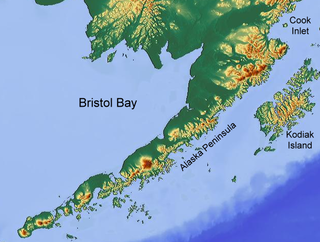
Alaska is a U.S. state in the northwest extremity of North America, just across the Bering Strait from Asia. The Canadian province of British Columbia and territory of Yukon border the state to the east, its most extreme western part is Attu Island, and it has a maritime border with Russia to the west across the Bering Strait. To the north are the Chukchi and Beaufort seas—southern parts of the Arctic Ocean. The Pacific Ocean lies to the south and southwest. It is the largest state in the United States by area and the
seventh largest subnational division in the world. In addition, it is the 3rd least populous and the most sparsely populated of the 50 United States; nevertheless, it is by far the most populous territory located mostly north of the 60th parallel in North America: its population—estimated at 738,432 by the United States Census Bureau in 2015— is more than quadruple the combined populations of Northern Canada and Greenland. Approximately half of Alaska's residents live within the Anchorage metropolitan area. Alaska's economy is dominated by the fishing, natural gas, and oil industries, resources which it has in abundance. Military bases and tourism are also a significant part of the economy.

Interior Alaska is the central region of Alaska's territory, roughly bounded by the Alaska Range to the south and the Brooks Range to the north. It is largely wilderness. Mountains include Denali in the Alaska Range, the Wrangell Mountains, and the Ray Mountains. The native people of the interior are Alaskan Athabaskans. The largest city in the interior is Fairbanks, Alaska's second-largest city, in the Tanana Valley. Other towns include North Pole, just southeast of Fairbanks, Eagle, Tok, Glennallen, Delta Junction, Nenana, Anderson, Healy and Cantwell. The interior region has an estimated population of 113,154.

Eskimo or Eskimos are the indigenous peoples who have traditionally inhabited the northern circumpolar region from eastern Siberia (Russia) to across Alaska, Canada, and Greenland.

The Yukon River is a major watercourse of northwestern North America. The river's source is in British Columbia, Canada, from which it flows through the Canadian Yukon Territory. The lower half of the river lies in the U.S. state of Alaska. The river is 3,190 kilometres (1,980 mi) long and empties into the Bering Sea at the Yukon–Kuskokwim Delta. The average flow is 6,430 m³/s (227,000 ft³/s). The total drainage area is 832,700 km² (321,500 mi²), of which 323,800 km² (126,300 mi²) is in Canada. The total area is more than 25% larger than Texas or Alberta.

The Yupik are a group of indigenous or aboriginal peoples of western, southwestern, and southcentral Alaska and the Russian Far East. They are Eskimo and are related to the Inuit and Iñupiat peoples. Yupik peoples include the following:

Southeast Fairbanks Census Area is a census area located in the U.S. state of Alaska. As of the 2010 census, the population was 7,029. It is part of the unorganized borough and therefore has no borough seat. Its largest communities are Deltana and Tok, both unincorporated CDPs.

Big Delta is a census-designated place (CDP) in Southeast Fairbanks Census Area, Alaska, United States. The population was 591 at the 2010 census, down from 749 in 2000. Big Delta is at the confluence of the Delta River and the Tanana River and gets its name from the huge river delta formed by the confluence.

Delta Junction is a city in the Southeast Fairbanks Census Area, Alaska, United States. As of the 2010 census, the population was 958, up from 840 in 2000. The 2016 estimate was down to 934. The city is located a short distance south of the confluence of the Delta River with the Tanana River, which is at Big Delta. It is about 160 km (99 mi) south of Fairbanks. Native inhabitants are Tanana Athabaskans.

The Delta River is an 80-mile (130 km) tributary of the Tanana River in the U.S. state of Alaska. Its name in the Ahtna language is Saas Na’ . Fed by the Tangle Lakes of the Alaska Range, the river flows north to meet the larger river near Big Delta.

Cynthia Geary is an American actress best known for her role as Shelly Tambo in the television series Northern Exposure. In her Emmy-nominated role, she played a former Miss Northwest Passage beauty queen living with a decades-older lover, Holling Vincoeur. Together they ran Cicely, Alaska's tavern and restaurant, The Brick.

The Yukon Delta National Wildlife Refuge is a United States National Wildlife Refuge covering about 19.16 million acres (77,500 km2) in southwestern Alaska. It is the second-largest National Wildlife Refuge in the country, only slightly smaller than the Arctic National Wildlife Refuge. It is a coastal plain extending to the Bering Sea, covering the delta created by the Yukon and Kuskokwim rivers. The delta includes extensive wetlands near sea level that are often inundated by Bering Sea tides. It is bordered on the east by Wood-Tikchik State Park, the largest state park in the United States. The refuge is administered from offices in Bethel.

Southwest Alaska is a region of the U.S. state of Alaska. The area is not exactly defined by any governmental administrative region(s); nor does it always have a clear geographic boundary.
Ann Fienup-Riordan is an American cultural anthropologist known for her work with the Yup'ik of western Alaska, particularly on Nelson Island and the Yukon–Kuskokwim Delta. She lives in Anchorage, Alaska.

The Yup'ik or Yupiaq and Yupiit or Yupiat (pl), also Central Alaskan Yup'ik, Central Yup'ik, Alaskan Yup'ik, are an Eskimo people of western and southwestern Alaska ranging from southern Norton Sound southwards along the coast of the Bering Sea on the Yukon-Kuskokwim Delta and along the northern coast of Bristol Bay as far east as Nushagak Bay and the northern Alaska Peninsula at Naknek River and Egegik Bay. They are also known as Cup'ik by the Chevak Cup'ik dialect-speaking Eskimos of Chevak and Cup'ig for the Nunivak Cup'ig dialect-speaking Eskimo of Nunivak Island.
Grant Aviation is a regional airline that serves the town of Kenai, the Yukon-Kuskokwim Delta, Bristol Bay and the Aleutian Chain in Alaska. The airline was formed in 1971 as Delta Air Services based in Emmonak. The current owners are Bruce McGlasson and Mark "Woody" Richardson, who purchased the airline in 2004.

The Tanana Athabaskans, Tanana Athabascans or Tanana Athapaskans are an Alaskan Athabaskan peoples of the Athabaskan-speaking ethnolinguistic group. They are the original inhabitants of the Tanana River drainage basin in east-central Alaska Interior, United States and a little part lived in Yukon, Canada. Tanana River Athabaskan peoples are called in Lower Tanana and Koyukon language Ten Hʉt'ænæ, in Gwich'in language Tanan Gwich'in. In Alaska, where they are the oldest, there are three or four groups identified by the languages they speak. These are the Tanana proper or Lower Tanana (Kokht'ana) and/or Middle Tanana, Tanacross or Tanana Crossing (Koxt'een), and Upper Tanana (Kohtʼiin). The Tanana Athabaskan culture is a hunter-gatherer culture and have a matrilineal system. Tanana Athabaskans were semi-nomadic and as living in semi-permanent settlements in the Tanana Valley lowlands. Traditional Athabaskan land use includes fall hunting of moose, caribou, Dall sheep, and small terrestrial animals, and also trapping. The Athabaskans did not have any formal tribal organization. Tanana Athabaskans were strictly territorial and used hunting and gathering practices in their semi-nomadic way of life and dispersed habitation patterns. Each small band of 20–40 people normally had a central winter camp with several seasonal hunting and fishing camps, and they moved cyclically, depending on the season and availability of resources.

Colville Delta is a river delta in northern Alaska that flows into Harrison Bay. The delta is so flat that it has been said that it is indiscernible where the river ends and the ocean begins. The powerful outflow of the Colville River creates a shallow region that is rich with nutrients, making it ecologically significant for wildlife.

















